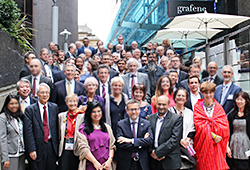
Networking session
ESOF is a comprehensive science forum that EuroScience, Europe’s largest scientific organization, hosts every two years, and is dedicated to contributing to promoting scientific research and the creation of innovation. This series of forums has a significant impact on researchers, as well as governments, industrial sectors and the media.
At ESOF 2016, which was held in Manchester, UK—famous for the Industrial Revolution—JST hosted several sessions, delivered speeches and set up a JST stand.
In the session “revolutionizing regional and global initiatives—should the ‘old world’ make more space?” cohosted by the JST Center for Science and Communication and the South African Department of Science and Technology, Dr. NAKAMURA Michiharu, the counselor to JST President, discussed with five intellectuals from the South African government, the American Association for the Advancement of Science (AAAS), the French National Center for Scientific Research (CNRS), UNESCO and the United Nations. Dr. NAKAMURA introduced characteristics of Japan’s diplomacy in science and technology (S&T) and JST’s approaches developed in Asian countries, and shared from past experience how important it is to maintain scientific relationships on an equal footing with partner countries. The questions and answers of the session attracted approximately 50 audiences and brought about a rich dialogue through the exchange of opinions with regard to the effect of S&T diplomacy and future challenges of those regions. Participants came to the conclusion that diplomacy used to act as arts and practices of protecting their own homelands, but now has become skills in making the world a better place.
The JST Center for Research and Development Strategies (CRDS) hosted the “Wisdom Computing” session, where a spirited debate took place between a member of the European Commission (EC), a professor from a UK-based university, Dr. HAGITA Norihiro, Director at the Intelligent Robotics and Communication Laboratories, and ARIMOTO Tateo and Dr. IWANO Kazuo, Principle Fellows from JST. The session dealt with the theme to the effect that this is a key way in which we establish appropriate relationships and tell the difference in roles between humans and machines in order to advance “Wisdom Computing,” the R&D subject that has contributed to achieving human-machine creative collaboration. Speakers shared a common understanding with about 40 audiences that Japan has assumed leadership roles of promoting this subject of research.
At the JST stand, we explained our profile and displayed banners promoting our activities, such as international collaborative research programs (SICORP, SATREPS and others), Strategic Basic Research Programs, Promoting Technology Transfer and Innovation, Center for Science and Communication, Promotion of Diversity, and National Museum of Science and Innovation (Miraikan). We also outlined our activities and research results we’ve accomplished using videos and through short presentations. The JST stand was a huge success during all of the sessions and welcomed over 485 visitors over the four days.
The liaison group consisting of seven scientific organizations from around the world, including JST, which worked to contribute to promoting S&T over a period of time, submitted to the EU the joint proposal on “the necessity for a long-term investment in S&T,” and exchanged ideas with MOEDAS Carlos, an EU commissioner designate for Research, Science and Innovation. We also advertised the Science Agora 2016, which will be held in November, at the joint press conference with four scientific forums, and enhanced cooperation with science communities from various countries by cohosting the networking session with the South African government.
Moreover, JST took part in a high level forum of ESOF 2016 with major countries’ science advisors and joined a discussion devoted to considering the role of scientific advice for S&T policies. We could contribute to designing basic documents for the International Network for Government Science Advice (INGSA) and the World Science Forum (WSF) 2017, at which principles for science advice for the future will be introduced.
JST will continue disseminating its activities by participating in this type of grand international forums in science, as well as make every effort to establish foundations for future collaboration including new S&T cooperation by interacting with the science communities from all over the world.
The next ESOF will be held in July 2018 in Toulouse, France.
- - EuroScience Open Forum website
http://www.esof.eu - - The joint proposal link
http://www.euroscience.org/news/keep-investing-long-term-science/
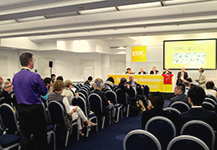
S&T diplomacy session
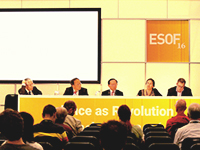
Wisdom computing session
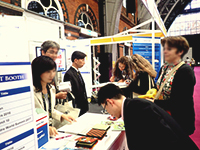
JST stand
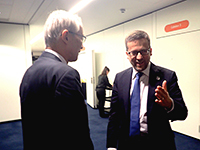
Counselor to the JST President Dr. NAKAMURA and EU commissioner MOEDAS Carlos
JST, an integrated organization of science and technology in Japan, establishes an infrastructure for the entire process from the creation of knowledge to the return to the society. For more information, visit http://www.jst.go.jp/EN/